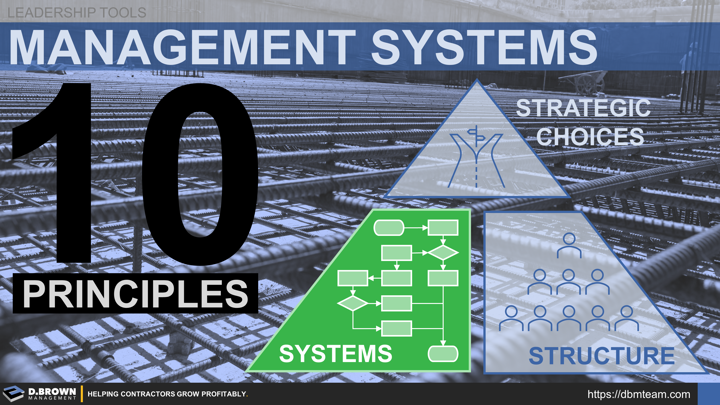For a contractor, each stage of growth requires different leadership focus, strategic decisions, management systems, and organizational structures.
The fifth of the Five Interlinked Questions to Define Your Strategy is about the management systems required to build and maintain the key capabilities required to win in your chosen markets.
10 Notes and Principles About Management Systems
- Management systems define the sequencing and timing of inputs, tasks, and decisions along with tools used and by who, that lead to the most predictable outcomes given the range of potential inputs, tools/equipment, people involved, human error, and other external conditions.
- Management systems put tasks and decisions into the hands of the people for their highest and best use including escalations. Same applies to tools, equipment, or other resources.
- The range of outcomes (variability) produced by the management systems must fit within the business model for viability.
- Like an HVAC system – it isn’t a system if it doesn’t have feedback loops to ensure consistent operation with the range defined by the standards – think temperature setting and high/low triggers from thermostat. This is the role of the managers of the people who work within the management system.
- A Management Structure IS NOT a Management System.
- Management systems must continuously develop people while they are using the system so they can progressively do one of the three:
- Learn other tasks and decisions of a similar level for cross-training. Everyone can do this, and it provides career path opportunities.
- Gain mastery level capabilities around the tasks and decisions they are responsible for including the ability to teach others and suggest improvements to the system. Fewer people will have the aptitude to do this – must look for them as they are the multipliers.
- Progressively learn higher-level tasks and decisions. Even fewer people will have the aptitude to do this, but these are the future leaders in the organization.
- All systems are some degree of a sub-system. There is always a bigger overall system.
- All systems start with a problem to solve and an individual figuring out how to solve that problem, usually through trial and error.
- Management system complexity must be aligned with team capabilities, organizational size, and strategy complexity. "Make everything as simple as possible, but not simpler." - Einstein
- Perfect alignment on timing and complexity level is never possible.
On a scale of 0-10, how would you evaluate the effectiveness of your management systems within each element of the Contractor Business Model as it applies to your company?
- Business Development
- Estimating
- Preconstruction
- Design
- Fabrication
- Purchasing
- Project Management
- Service Management
- Field Management
- Equipment
- Accounting
- Technology
- Business Planning & Execution
- Strategic Market Choices
- Talent Value Stream

